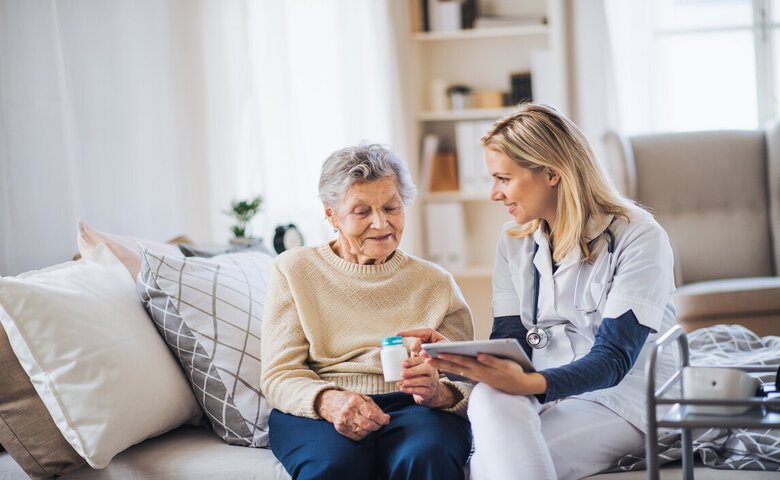The healthcare landscape is continually evolving, with innovations aimed at improving access and quality of care. One significant development is the practice of providing medical consultations at home, a service that can be especially beneficial for elderly patients. “Why Elderly Patients Need Doctor Consultation at Home” is a crucial question, as it addresses the unique healthcare needs of seniors who may face mobility challenges and benefit greatly from in-home medical care.
Table of Contents
Why Elderly Patients Need Doctor Consultation at Home?
Understanding “Why Elderly Patients Need Doctor Consultation at Home” highlights the significance of reducing the risk of infections, fostering a more supportive environment, and ensuring timely medical interventions for senior patients in the comfort of their homes. In this article, we will explore the reasons why elderly patients need doctor consultations at home and how this approach to healthcare can enhance their overall well-being.
Comfort and Convenience
Elderly individuals often face mobility challenges, which can make visiting a clinic or hospital a daunting and uncomfortable experience. Doctor consultations at home offer a higher level of comfort and convenience for these patients, allowing them to receive medical attention in a familiar and less stressful environment. This can reduce anxiety and enhance their overall healthcare experience.
Improved Compliance
Elderly patients may have complex medical conditions that require ongoing care and follow-up appointments. Home consultations can improve patient compliance with treatment plans, medication regimens, and recommended lifestyle changes. By bringing the doctor to the patient, it becomes easier for elderly individuals to manage their health effectively.
Personalized Care
Medical professionals who provide home consultations can take the time to understand the unique needs and circumstances of each elderly patient. This personalized approach allows for more tailored treatment plans and a better understanding of the patient’s living conditions, which can be essential in making appropriate recommendations.
Reduced Risk of Infections
Hospitals and clinics can be hotbeds for contagious diseases, and elderly patients are more susceptible to infections. Home consultations help reduce the risk of exposure to various pathogens, keeping elderly patients safe and reducing the chances of healthcare-associated infections.
Support for Family Caregivers
Many elderly patients are supported by family caregivers who play a crucial role in their daily care. Home consultations provide an opportunity for caregivers to engage with healthcare professionals, seek guidance, and learn about best practices for caring for their loved ones. This, in turn, reduces the burden on family caregivers and enhances the overall quality of care provided to the elderly patient.
Mental and Emotional Well-being
Elderly patients may feel more relaxed and secure in their home environment, which positively impacts their mental and emotional well-being. This comfort level can lead to better communication with healthcare providers, more open discussions about their health concerns, and improved adherence to prescribed treatments.
Timely Interventions
In some cases, elderly patients may have difficulty recognizing the signs of deteriorating health or emergencies. Home consultations ensure that healthcare professionals can monitor patients regularly and provide timely interventions when necessary. This proactive approach can be life-saving for many elderly individuals.
Elder Care at Home

Elder care is a topic of growing significance as the world’s population continues to age. While various care options are available, one approach that has gained prominence and acceptance in recent years is providing elder care at home. This compassionate and personalized method of caregiving offers numerous benefits for seniors and their families. In this article, we will explore the concept of elder care at home and why it is an increasingly popular choice for those seeking to support their elderly loved ones.
Elder care at home is a compassionate and holistic approach that prioritizes the well-being, comfort, and independence of elderly individuals. It is a solution that offers numerous benefits, not only for seniors themselves but also for their families. As the aging population continues to grow, the importance of providing personalized, in-home care becomes increasingly clear. This approach enables seniors to age with dignity and grace, surrounded by the warmth and familiarity of their cherished homes.
The Rise of Elder Care at Home
Elder care at home, often referred to as in-home care, allows seniors to receive the necessary support and assistance while continuing to live in the comfort and familiarity of their own homes. It is a holistic approach that focuses on enhancing the quality of life for elderly individuals, both in terms of their physical and emotional well-being.
Key Components of Elder Care at Home
Personalized Care: One of the most significant advantages of home-based elder care is the level of personalization it offers. Caregivers tailor their services to meet the specific needs and preferences of each individual. Whether it’s assistance with daily activities, medication management, or companionship, the care plan is designed to suit the senior’s unique circumstances.
Maintaining Independence: Elder care at home is not about taking away a senior’s independence; rather, it’s about preserving it. Caregivers empower elderly individuals to continue with their daily routines, hobbies, and social activities, allowing them to maintain a sense of control and dignity.
Familiar Surroundings: Home is where the heart is, and for many seniors, the familiarity of their own space is a source of comfort. Aging in a place filled with memories and personal belongings can have a positive impact on mental and emotional well-being.
Benefits of Elder Care at Home
Enhanced Quality of Life: Home-based care promotes a higher quality of life for seniors by ensuring that their needs are met in an environment where they feel safe and secure. It often results in better mental and emotional health, reducing the risk of depression and anxiety.
Family Involvement: Elder care at home encourages family involvement. Family members can actively participate in the care process, gaining a deeper understanding of their loved one’s needs and providing emotional support.
Cost-Effective: In-home care can be more cost-effective than full-time residential care in a facility. It allows seniors to receive the necessary assistance without the expenses associated with institutional care.
Preventing Isolation: Home-based care helps combat social isolation, a common issue among the elderly. Caregivers provide companionship, engage in conversations, and facilitate social activities, ensuring that seniors remain socially connected.
Conclusion:
Providing doctor consultations at home for elderly patients represents a significant step forward in the healthcare industry. It prioritizes patient comfort, safety, and personalized care while supporting family caregivers and reducing the risk of infections. As the population continues to age, the importance of this approach becomes increasingly clear. It not only enhances the well-being of elderly patients but also contributes to a more compassionate and efficient healthcare system that meets the unique needs of this growing demographic.
Also Read: Why We Should Care Our Elders?
Image credit: Yandex.com















